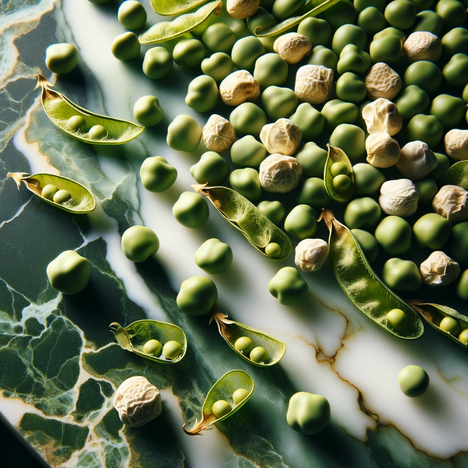Dried peas

In the diverse world of dog nutrition, new ingredients are constantly appearing to promote the well-being of our four-legged friends. One such ingredient that has been attracting more and more attention recently is dried peas. However, despite their popularity in many dog food recipes, their use also raises questions. What exactly are dried peas, and what benefits do they have for your dog's health? At the same time, it's important to keep an eye out for potential downsides. In this article, we explore the pros and cons of dried peas in dog food to give you the full picture.
Dried peas: an overview
The essence of the pea
Dried peas are nothing more than peas that have been preserved by removing moisture. This process preserves the nutrients and makes peas a convenient, nutritious ingredient in a dog's diet. They are a good source of vegetable protein, fiber and various vitamins and minerals.
Benefits: Why peas can be good for your dog
Rich in nutrients
Dried peas are rich in protein, which makes them an excellent addition to your dog's diet, especially for vegetarian or low-allergen diets. They also contain essential vitamins such as B vitamins, vitamin K and minerals such as phosphorus, magnesium and iron, which contribute to your dog's overall health.
Promoting digestion
The high fiber content in dried peas can aid digestion and help maintain a healthy weight. Fiber supports regulated digestion and can reduce the risk of indigestion.
Heart health and more
Dried peas contain certain compounds that can support heart health. In addition, the low fat content and high nutrient mix can help regulate cholesterol levels, minimizing the risk of heart disease.
Disadvantages: Considerations for feeding peas
Potential risk of bloating
Despite their many benefits, dried peas can cause digestive problems such as bloating in some dogs. This is because peas contain complex carbohydrates that some dogs find difficult to digest.
Balanced diet required
Dried peas should only form part of your dog's diet. An over-reliance on peas as a protein source can lead to an unbalanced intake of essential amino acids, as plant proteins have a different amino acid profile compared to animal proteins.
Controversy surrounding peas in dog nutrition
Recently, there have been discussions about the link between the intake of dried peas and the development of dilated cardiomyopathy (DCM) in dogs. The research is not yet conclusive and further studies are needed to establish a definitive link.
Part of the whole
Dried peas undoubtedly offer a number of benefits to your dog's diet, from aiding digestion to providing essential nutrients. However, as with any ingredient in a dog's diet, a balanced approach is key. It's important to diversify your dog's diet and make sure to include an appropriate amount of dried peas to minimize potential downsides. Ultimately, the decision to include dried peas in your dog's diet should be made in consultation with a vet or nutritionist to ensure it meets your four-legged friend's individual needs.
If you notice any signs of hypersensitivity or poisoning in your dog, you should see your vet immediately. We are not a substitute for a vet, but we try to be as accurate as possible. Every dog reacts differently and we recommend you get a second opinion or consult your vet if in doubt.
Stay healthy and take good care of your four-legged friend!😊